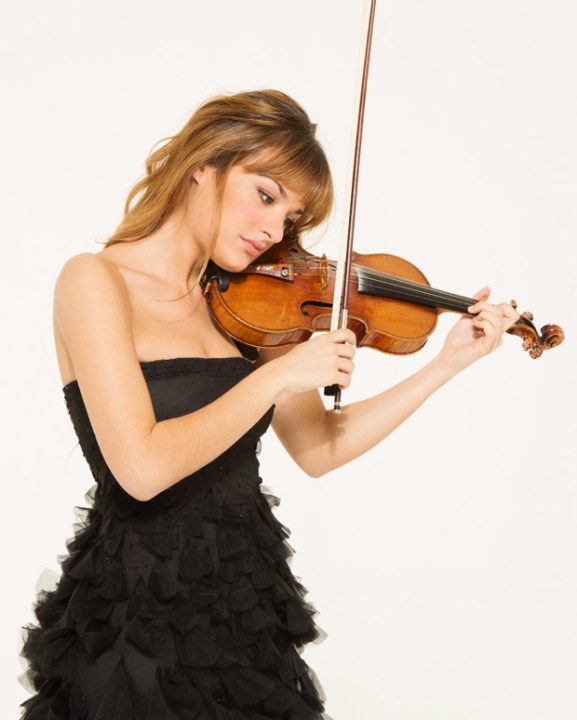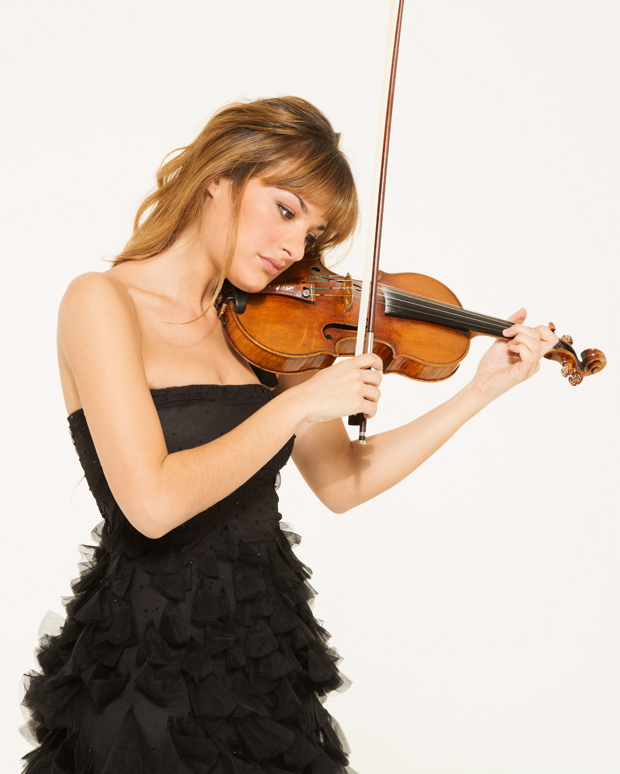On 18 September, the Scots will decide whether they want to become independent. But it is only a coincidence that Scotland’s most celebrated violinist is launching an album that brings together Scottish folk music, the tunes of Robert Burns and Max Bruch’s Scottish Fantasy. Nonetheless, I want to know where Nicola Benedetti stands on the most fundamental question the Scots have asked of themselves since the Act of Union in 1707.
I’m sitting opposite her in the west London flat she shares with her German cellist boyfriend Leonard Elschenbroich. The late morning light from the window is catching her rich brown hair and turning it blonde. Is she, I ask, excited about the Referendum? ‘No. Terrified. I’m terrified either way. It’s a big moment and it’s a scary moment.’ There are, she feels, too many unknowns. ‘The more I think about it, the more my opinion is that people have to go on a fundamental principle, because the practicalities are impossible to predict.’ For her, the fundamental principle is a ‘slightly romantic’ one. ‘Do you feel a part of Britain or do you want to be independent? Are you willing to say, “I want the idea of independence despite the fact that it may be worse for us in some way or another”? Or vice versa.’ She has found herself changing her mind and won’t tell me whether she’s reached a settled position.
Benedetti was born nearly 27 years ago to a half-Scottish, half-Italian mother and Italian father and brought up in West Kilbride. She followed her elder sister into playing the violin at just four and left Scotland to study at the Yehudi Menuhin School when she was ten. A decade ago she won the BBC Young Musician of the Year award for her performance of Karol Szymanowski’s Violin Concerto No. 1. So successful has she become that this interview was postponed after she was invited as a stand-in, at the very last minute, to play the piece with the New York Philharmonic Orchestra at Avery Fisher Hall.
What, I wonder, does her Scottishness mean to her? ‘In practical terms, it often means an immense warmth and acceptance from people all over the world. Saying you’re Scottish is something people like,’ she says and laughs. ‘Saying you’re Scottish–Italian is something people like even more,’ she adds and laughs even harder. She had been waiting for the right moment to make a Scottish-themed album and while playing Bruch’s Scottish Fantasy decided to use it as a stepping stone to explore folk music. ‘I’m probably the only international touring Scottish violinist at the moment and not taking a fiddle component with me on that circuit has always been a little bit of a strange thing.’
Bruch never visited Scotland, but Benedetti feels that his Fantasy — and not just the parts explicitly built on Scottish tunes — captures its essence. ‘I always think there’s a heaviness to Scotland. Not in a negative way, but the people are very grounded. There aren’t a lot of airs and graces. Things are sort of as they seem. And the weather,’ she continues, ‘and how the scenery looks in that weather — everything has a weight to it. Bruch captures that so sincerely.’
Beyond her small repertoire of reels and airs, playing folk music was a new experience for Benedetti. She recorded with a Scottish band and the demands were very different from those she was used to in classical music. The muscles required weren’t the same. ‘It felt harder for me because I wasn’t used to it. By the end of the recording sessions I felt like a bit of wreck physically. I had 24 hours between that and then having to go into a studio with a symphony orchestra to record the Bruch. I didn’t know how I was going to do it. I felt like someone had literally just put my limbs in different places. I felt so disorientated and strange. I just had a very long bath,’ she says, laughing again, ‘and tried to shake my arms out. I got there.’
Only hours before we meet, Benedetti stepped off another flight. She’s just back from performing in Copenhagen. Her schedule is packed. ‘My issue is always over enthusiasm for too many things. I just want to do everything all the time,’ she explains. Does she, I wonder, ever fail to meet the standards she expects of herself? ‘Occasionally because of scheduling, but most of the standards I fail to meet are nothing to do with that. My inner hearing has this ideal and what I’m constantly trying to do is work out how, physically, to get to that place. Most of the time I feel like I fall short of what my ear is looking for.’
Elschenbroich is leaving to prepare for a Ravel recital. ‘Have a good concert,’ Benedetti calls after him. He is developing his own reputation as a cellist, but I can’t imagine it’s easy to date someone as busy as Benedetti. ‘It takes a secure and thoroughly focused and serious person in what they’re doing to be OK with everything that I’m doing and Leonard is the most unpossessive person in the whole world. He’s got so much of his own stuff going on he doesn’t need to be concerned about what I’m doing or not doing. But he’s quite rare in terms of his natural security.’
Benedetti knows that she takes an ‘OK photo’ but she wears the success her talent and, arguably, her looks have brought her lightly. She is committed to her craft and can practise up to six hours a day. Neither of her parents play instruments. ‘No one person in my whole extended family could read music or play an instrument properly,’ she says. ‘They never had the opportunity to — my sister and I were the first people on both sides of my family who could actually afford to have music lessons.’
Months of the year are blocked out by Benedetti for educational work — from master classes at the Royal College of Music to bringing music to children from underprivileged backgrounds with the charity Sistema Scotland. Her efforts stem, she says, from a deep-rooted belief in the powers of a creative element to education. And, citing recent polls, she says it’s in decline. ‘It is one of the most potent ways to tap into someone’s innate confidence. Singing in a choir, you’re having to express yourself but also take into consideration a whole group. Think of just how many little life skills you’re learning. No matter how hard you look, you cannot find evidence against that.’
Whether Scotland remains part of the United Kingdom or not, it has spawned a violinist and a personality to be proud of. There is an infectious warmth and sense of fun about Benedetti and she is, she says, very happy. ‘I feel entirely fortunate practically all the time.’ Then, uncharacteristically, she swears. ‘The only time I’m really unhappy is when I pick up my violin and I think I really sound like shit. My happiness does fluctuate depending on that. If 24 hours go by and I haven’t worked out how to get myself playing better again, I’m just distraught, like life is going to end.’ She laughs. ‘It’s a little bit extreme.’
Nicola Benedetti is Artist in Residence at the Cheltenham Music Festival from 2 July







Comments